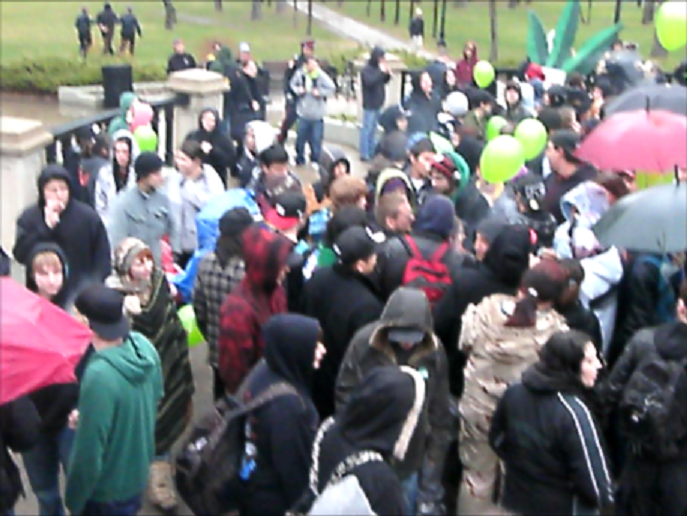Reflections on 420, 2016: The War On Drugs Is Almost Over
Reflections on 420, 2016: The War On Drugs Is Almost Over

Today's 420 events across Canada had the usual relaxed, positive crowds and thick smoke clouds, but coupled with a new feeling of greater optimism than cannabis users have had before.
Last 4/20, Stephen Harper was still in power, still trying to have his minimum sentencing laws enforced despite them being thrown out by the courts. There was the possibility that he would win another majority, which would increase the liklihood of the legislation being changed just enough to withstand a court challenge.
With the Liberal victory, Trudeau's promise to legalize cannabis might make it seem like the battle is over. But the changes are being delayed, with an announcement that we won't start with any changes until 2017.
Further, we are seeing what a 'legal' regime might look like, exemplified by the altogether negative attitude of former Toronto Police Chief Bill Blair, who was put in charge of the process in a move that legalization supporters find baffling.
The attitudes of police in Canada are baffling as well. With the expectation of legalization coming soon, why are police cracking down harder? Why are compassion clubs that were open under Harper's rule being closed now? Why was activist Dana Larson arrested for handing out seeds at a rally when seed sales have been happening openly in Canada for years?
At the international level, major changes are also expected, but there is also disappointing signs of resistance from the old war on drugs establishment. This year, April 19-21, world leaders are meeting to discuss changes to the United Nations Single Convention On Drugs and other major global policy agreements, possibly opening the way for legalization globally.
For once, Canada is on the right side. Canada's Health Minister, Jane Philpott spoke against the war on drugs at the UN summit and announced the plan to legalize in Canada in 2017.
Former UN Secretary General Koffi Annan's bold statement against the war on drugs is a positive indicator. He criticized the misdirection of law enforcement that seems to favor the criminal syndicates over ordinary people, "A criminal record for a minor drug offence can be a far greater threat to the well being of a young person than occasional drug use. In many parts of the world, drug users are stigmatized, live under constant threat of arrest and are prevented from seeking treatment and support.
Even when policies aimed at drug cartels have been relatively successful, they often simply shift the problem elsewhere: reduction in one country lead to increase in another. We know too that when law enforcement suppresses the supply of one substance many users simply switch to other, sometimes more harmful substances. So I am convinced that current drug policies have to be reformed to ensure that they encourage prevention and treatment practices based on evidence of what works."
Annan went on to talk about what needed to be done differently:
"The current drug policies are not achieving that goal. So the question is: what policies would enable governments and health authorities to counter and reduce the social and health harms that drug use can cause? I have three suggestions.
First, decriminalize drug use. Punitive measures do not work and put lots of people in prison where their drug use may actually get worse.
Second, strengthen treatment services, especially in middle and low-income countries. The West Africa Commission on Drugs, which I convened, did not find a single treatment centre in that region which meets international minimum standards. Fortunately Senegal and some other countries are now opening new facilities; donors should help to expand such facilities throughout the region.
Third, we need to learn how to live with drugs so they cause the least possible harm. Even though we would like a “drug-free world”, this is not a realistic ambition. Tobacco is an example of how a dangerous and addictive product is being regulated because we know that it cannot be simply outlawed.".
This is a very important development, because for many decades, the UN has been a major obstacle for legalization movement, as the UN Single Convention On Narcotics is used as an excuse to block referendum results and ignore the will of the people in many countries, and many countries were penalized for defying the UN on this issue. It's been clear that at total change had to happen everywhere in order to happen anywhere.
For many reasons, positive change at the UN level has been very difficult to achieve, even though the United Nations Office On Drugs And Crime (UNODC) has admitted the war on drugs has made virtually every problem worse, as pointed out in the very definitive briefing given by 'Count The Costs' .
Major problems caused by drug prohibition identified in the briefing, admitted to by UNODC, include:
- The creation of a lucrative and violent illicit drug market
- The redirection of scarce resources from proven health interventions to punitive law enforcement
- The “balloon effect”, whereby enforcement efforts in one area simply displace drug production and/or drug markets to another area, rather than eliminating them
- The displacement of drug consumption from one substance to another, sometimes more risky alternative
- The stigmatization and marginalization of people who use drugs, which in turn reduces their likelihood of receiving treatment when they need it

